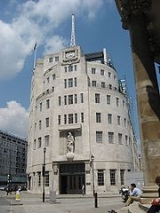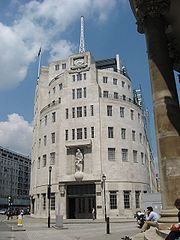
BBC Forces Programme
Encyclopedia

BBC
The British Broadcasting Corporation is a British public service broadcaster. Its headquarters is at Broadcasting House in the City of Westminster, London. It is the largest broadcaster in the world, with about 23,000 staff...
radio station
Radio station
Radio broadcasting is a one-way wireless transmission over radio waves intended to reach a wide audience. Stations can be linked in radio networks to broadcast a common radio format, either in broadcast syndication or simulcast or both...
which operated from 7 January 1940 until 26 February 1944.
Foundation
Upon the outbreak of World War IIWorld War II
World War II, or the Second World War , was a global conflict lasting from 1939 to 1945, involving most of the world's nations—including all of the great powers—eventually forming two opposing military alliances: the Allies and the Axis...
, the BBC closed the existing BBC National Programme
BBC National Programme
The BBC National Programme was a BBC radio station from the 1920s until the outbreak of World War II.-Foundation:When the BBC first began transmissions on 14 November 1922, the technology for both national coverage and joint programming between transmitters did not exist – transmitter powers were...
and BBC Regional Programme
BBC Regional Programme
The BBC Regional Programme was a UK radio network which operated from the end of the 1920s until the outbreak of World War II in 1939.-Foundation:...
, combining the two to form a single channel known as the BBC Home Service
BBC Home Service
The BBC Home Service was a British national radio station which broadcast from 1939 until 1967.-Development:Between the 1920s and the outbreak of The Second World War, the BBC had developed two nationwide radio services, the BBC National Programme and the BBC Regional Programme...
.
Domestically, the BBC's medium-wave transmitters continued to broadcast only the Home Service until the start of 1940, when – the lack of choice and of lighter programming for people serving in the Armed Forces having been noted – some of the former regional frequencies (804 and 877 kHz) were given over to a new service known as the BBC Forces Programme.
Programming
The BBC Home Service had been put together in a hurry and many of the pre-war favourite programmes had been lost. The new network mainly concentrated on news, informational programmes and music – in order to fill gaps in the schedule, Sandy MacPherson provided several hours a day of light organ music.It became clear that the members of the armed services during the Phoney War, especially those in France who had been expecting to fight, were now mainly sat in barracks with little to do. The BBC Forces Programme was launched to appeal directly to these men.
Its mixture of drama, comedy, popular music, features, quiz shows and variety was richer and more varied than the former National, although it continued to supply lengthy news bulletins and informational programmes and talk. Although intended for soldiers the Forces Programme was also a hit with large numbers of British civilians.
Programming was developed for specific services – "Ack Ack Beer Beer" for the anti-aircraft and barrage balloon stations, "Garrison Theatre" for the Army, "Danger - Men at Work", "Sincerely Yours, Vera Lynn" and "Hi Gang" for the forces generally – and popular American
United States
The United States of America is a federal constitutional republic comprising fifty states and a federal district...
variety programming was imported for the first time – "The Charlie MacCarthy Show", "The Bob Hope Show" and "The Jack Benny Hour".
Closure
The BBC Forces Programme was replaced when the influx of American soldiers, used to a different style of entertainment programming, had to be catered for in the run up to D-DayD-Day
D-Day is a term often used in military parlance to denote the day on which a combat attack or operation is to be initiated. "D-Day" often represents a variable, designating the day upon which some significant event will occur or has occurred; see Military designation of days and hours for similar...
. The replacement service was named the BBC General Forces Programme
BBC General Forces Programme
The BBC General Forces Programme was a BBC radio station from 27 February 1944 until 31 December 1946.-Foundation:Upon the outbreak of World War II, the BBC closed the existing BBC National Programme and BBC Regional Programme, combining the two to form a single channel known as the BBC Home...
and was also broadcast on the shortwave frequencies of the BBC Overseas Service (which itself had been known until 1939 as the BBC Empire Service and was relaunched again in 1965 as the BBC World Service
BBC World Service
The BBC World Service is the world's largest international broadcaster, broadcasting in 27 languages to many parts of the world via analogue and digital shortwave, internet streaming and podcasting, satellite, FM and MW relays...
).
After VE-Day
Victory in Europe Day
Victory in Europe Day commemorates 8 May 1945 , the date when the World War II Allies formally accepted the unconditional surrender of the armed forces of Nazi Germany and the end of Adolf Hitler's Third Reich. The formal surrender of the occupying German forces in the Channel Islands was not...
, the frequencies of the former National Programme (200 and 1149 kHz) became the BBC Light Programme
BBC Light Programme
The Light Programme was a BBC radio station which broadcast mainstream light entertainment and music from 1945 until 1967, when it was rebranded as BBC Radio 2...
.
Inheritance
The pre-war National Programme, whilst using the same frequencies and transmitters as the post-war Light Programme, was not the general entertainment network its successor the Light Programme became. The Light Programme was more of a child of the Forces and General Forces Programme, with a style of presentation and programming that had not existed in the United Kingdom before the war.Further reading
- Briggs, Asa History of Broadcasting in the United Kingdom Oxford:Oxford University Press 1995 ISBN 0-19-212930-9

